Intelligent Control System for MPPT in Photovoltaic and Fuel-Powered Vehicles
Problem Definition
From the literature review conducted, it is evident that the efficiency of solar systems heavily relies on the Maximum Power Point Tracking (MPPT) algorithms used to extract power from solar PV panels. Similarly, the charging process in Electric Vehicles (EVs) is a critical activity that has attracted the attention of experts who have experimented with various swarm intelligent algorithms. While these systems have shown promise in delivering superior results, they are not without their limitations. One major limitation is the decrease in performance as the size of error increases, leading to inefficiencies in power extraction. Moreover, the traditional systems struggle to adapt to continuously changing environmental conditions, resulting in errors in tracking the maximum power point.
Additionally, the inability of PV systems to harness solar energy for charging can pose significant challenges, impacting the overall performance of the system. Therefore, there is a clear need for the development of a more effective model that addresses these limitations and incorporates new techniques to enhance performance and reliability.
Objective
The objective is to develop a novel system that addresses the limitations of existing Maximum Power Point Tracking (MPPT) algorithms in solar systems and enhances charging efficiency for Electric Vehicles (EVs). The proposed model will incorporate an Adaptive Neuro-Fuzzy Inference System (ANFIS) controller for MPPT and a power source switching mechanism using a fuel cell. This system aims to optimize power extraction from solar panels, ensure continuous energy supply to EV batteries, and effectively manage the transition between power sources for uninterrupted charging in all conditions. The goal is to overcome inefficiencies in traditional systems and improve overall performance and reliability in charging EV batteries using solar energy and fuel cell technology.
Proposed Work
In the literature survey, it was found that existing MPPT algorithms utilized in solar systems have limitations that affect overall system performance. To address this, a novel system is proposed in this paper incorporating ANFIS controller for MPPT and a power source switching mechanism using a fuel cell to ensure continuous power supply to EV batteries. The proposed model aims to enhance performance by utilizing both fuzzy and neural networks in the ANFIS system. The MPPT controller extracts maximum power from solar panels, while the fuel cell provides energy when sunlight is insufficient. A switching module decides when to switch power sources, ensuring efficient charging even in challenging conditions.
With the incorporation of these techniques, the proposed model is expected to provide improved output.
The proposed work involves implementing a two-phase system where the ANFIS model controls MPPT using input variables error and changeInError. The ANFIS model generates Vref output based on these inputs, optimizing power extraction from solar panels. The introduction of a fuel cell in the system ensures continuous energy supply to EV batteries when solar power is unavailable. The switching mechanism effectively manages the transition between power sources, ensuring uninterrupted charging in all situations.
By combining these techniques, the proposed model aims to overcome the limitations of traditional MPPT systems and provide an efficient and reliable solution for charging EV batteries using solar energy and fuel cell technology.
Application Area for Industry
This project can be utilized in various industrial sectors such as renewable energy, electric vehicles, and power systems. The proposed solutions of implementing a neuro-fuzzy system and integrating a fuel cell address specific challenges faced by these industries. For instance, in the renewable energy sector, the project tackles the issue of maximizing power extraction from solar panels through efficient MPPT algorithms. In the electric vehicle industry, the project focuses on enhancing the charging process by utilizing advanced techniques like neural networks and fuzzy logic. Moreover, in power systems, the integration of a fuel cell ensures continuous charging of batteries even in the absence of sunlight, thereby increasing reliability and efficiency.
Overall, the implementation of these solutions offers benefits such as improved system performance, increased energy efficiency, and reliability in challenging environmental conditions.
Application Area for Academics
The proposed project can significantly enrich academic research, education, and training in the field of renewable energy systems and electric vehicles. By integrating neuro-fuzzy systems, MPPT algorithms, and fuel cells, the project offers a novel approach to enhance the performance of solar systems for EV charging. This research can contribute to advancing innovative research methods in optimizing power extraction from solar panels and improving the efficiency of EV charging systems.
The practical applications of this project in educational settings include utilizing simulations to understand the operation of the proposed ANFIS model and studying the integration of different technologies for maximizing energy utilization. This project offers a hands-on experience for students to learn about cutting-edge technologies in renewable energy and electric vehicles.
Researchers, MTech students, and PhD scholars in the field of electrical engineering, renewable energy, and smart transportation systems can benefit from the code and literature of this project for their own research work. They can explore the potential of neuro-fuzzy systems, MPPT algorithms, and fuel cells in optimizing energy management and improving the performance of solar systems for EV charging.
In the future, further research can be conducted to explore the scalability and adaptability of the proposed model in different environmental conditions and varying energy demands. The integration of machine learning techniques and advanced control algorithms can also be explored to enhance the effectiveness of the system. This project sets a foundation for future research in optimizing energy utilization in renewable energy systems for sustainable transportation solutions.
Algorithms Used
In this project, the FOPID (Fractional Order Proportional Integral Derivative), PID (Proportional Integral Derivative), PI (Proportional Integral) and MPPT (Maximum Power Point Tracking) algorithms are utilized to enhance the performance of a proposed system. The FOPID, PID, and PI algorithms are used in the control and management of the power generated by the solar panels, as well as in the charging process of the EV battery. These algorithms help optimize the efficiency and accuracy of power extraction from solar panels and charging of the EV battery. The MPPT algorithm plays a crucial role in extracting the maximum power from the solar panels by adjusting the operating point to the maximum power point. The use of a neural-fuzzy system in conjunction with the MPPT algorithm improves the performance of the system, making it more efficient and reliable.
Additionally, the incorporation of a fuel cell in the system, along with a switching module, ensures continuous charging of the EV battery even in the absence of sunlight, further enhancing the overall effectiveness of the system. By combining these algorithms and technologies, the proposed system aims to achieve improved output and provide efficient charging services for electric vehicles.
Keywords
SEO-optimized keywords: MPPT algorithms, solar systems, power extraction, charging activities, electric vehicles, swarm intelligent algorithms, limitations, error size, changing environment conditions, direction errors, traditional systems, solar energy, model efficiency, neuro-fuzzy system, fuel cell, MPPT controller, EV battery, fuzzy and neural networks, ANFIS model, solar panels, power generation, neuro-fuzzy based MPPT algorithm, fuel cell installation, switching module, charging services, power source switching, uninterrupted power supply, energy management, renewable energy, solar energy, energy conversion, power electronics, sustainable energy, hybrid energy system, energy efficiency, power generation, renewable energy integration.
SEO Tags
maximum power point tracking, MPPT algorithms, solar PV panels, EV charging, swarm intelligent algorithms, neuro-fuzzy system, fuel cell integration, ANFIS model, renewable energy, energy management, power electronics, hybrid energy system, energy efficiency, sustainable energy, solar energy, battery charging, power generation, energy conversion, power source switching, uninterrupted power supply, adaptive neuro-fuzzy inference system, photovoltaic systems, research scholars, MTech students, PHD students
| Shipping Cost |
|
No reviews found!













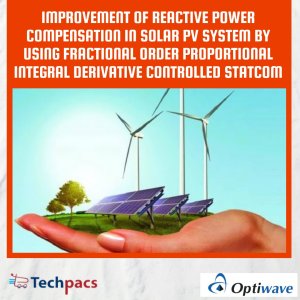
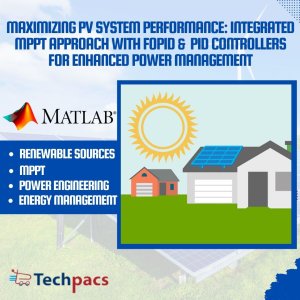
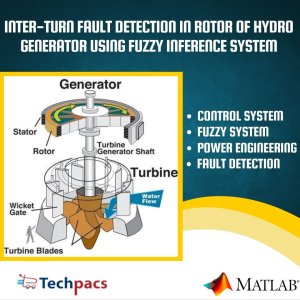
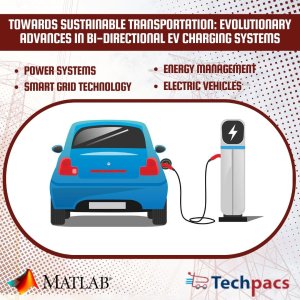
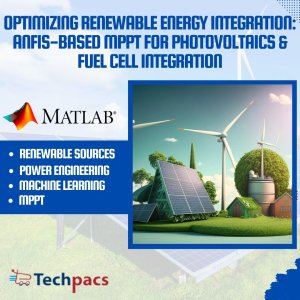































No comments found for this product. Be the first to comment!